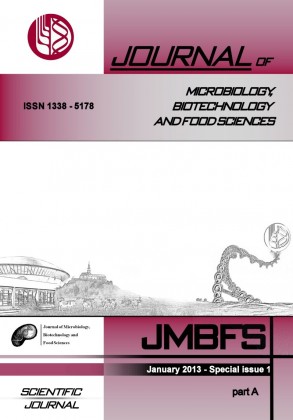BLOOD SELENIUM CONCENTRATION AFFECT MASTITIS AND MILK QUALITY IN DAIRY COWS
Keywords:
selenium, mastitis, milk, cowAbstract
Milk quality is usually defined in terms of mastitis. Milk with somatic cell count low then 400.000/ml and visibly normal (no clots) is considered high quality. Thirty Holstein cows were used in the study to determine affect blood serum selenium concentration on mastitis and milk quality. Cows received ad libitum access to potable water and daily 0.3 mg/kg inorganic selenium supplementation in food. Blood and milk samples were taken at first and sixth lactating month. Mean selenium blood serum concentrations were found to be lower within first lactating month, and then increased in the sixth lactating month. Average somatic cell count at first lactating month was 450.000/ml of milk and at sixth lactating month was 355.000/ml. On the basis of these results it can be conclude that selenium have importance in proper functioning of the mammary glands of cows, and in reducing mastitis and in improving milk quality.Downloads
Download data is not yet available.
Downloads
Published
2013-02-01
How to Cite
Ivana, D., Mihajlo, E., Miodrag, R., Ivan, S., & Zorana, K. (2013). BLOOD SELENIUM CONCENTRATION AFFECT MASTITIS AND MILK QUALITY IN DAIRY COWS. Journal of Microbiology, Biotechnology and Food Sciences, 2(special issue 2), 1147–1154. Retrieved from https://office2.jmbfs.org/index.php/JMBFS/article/view/7436
Issue
Section
Biotechnology
License
Copyright (c) 2013 Davidov Ivana, Erdeljan Mihajlo, Radinović Miodrag, StanÄÂić Ivan, KovaÄÂević Zorana

This work is licensed under a Creative Commons Attribution 4.0 International License.
All papers published in the Journal of Microbiology, Biotechnology and Food Sciences are published under a CC-BY licence (CC-BY 4.0). Published materials can be shared (copy and redistribute the material in any medium or format) and adapted (remix, transform, and build upon the material for any purpose, even commercially) with specifying the author(s).

